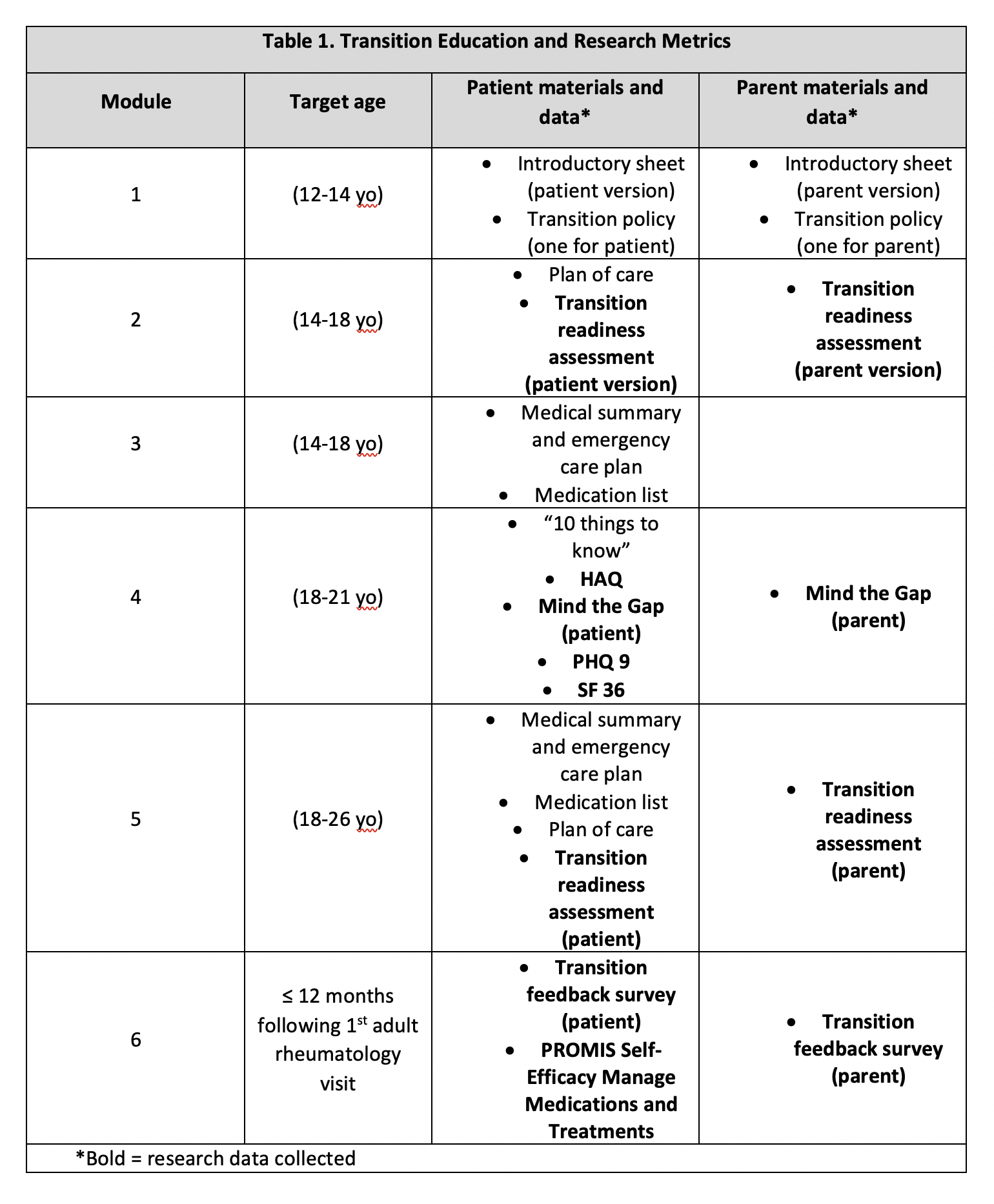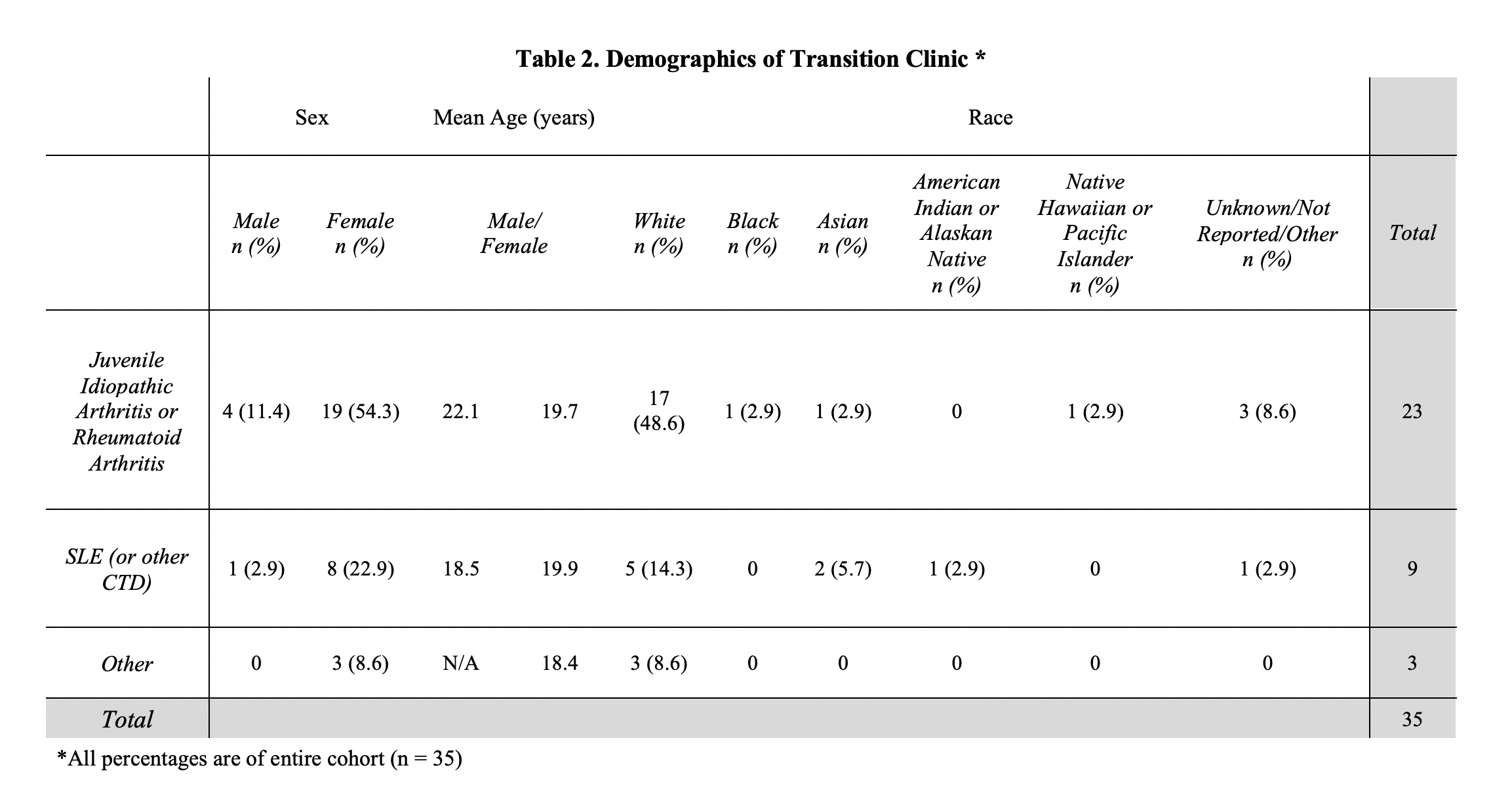Session Information
Date: Sunday, November 8, 2020
Title: Patient Outcomes, Preferences, & Attitudes Poster II: Miscellaneous Rheumatic Diseases
Session Type: Poster Session C
Session Time: 9:00AM-11:00AM
Background/Purpose: Transition from pediatric to adult rheumatology care is more likely to be successful if a transition program is in place. Previously successful interventions to improve transition outcomes have included integrating an adult subspecialist in the pediatric clinic setting. We hypothesize that we will improve transition outcomes by implementing a transition clinic which includes an adult rheumatologist providing care within a pediatric rheumatology clinic.
Methods: We initiated a weekly transition clinic in November 2018 called ACCORD (Adult Center for Childhood Onset Rheumatic Disease). This clinic is staffed by 1 adult rheumatologist (board certified in internal medicine and pediatrics), 2 pediatric nurses, and 2 research coordinators. Patients can be seen if they are ≥ 16 years old with known rheumatic disease or suspicion for rheumatic disease. All patients (and legal guardians) receive education and monitoring of transition readiness. We provide transition readiness education and feedback in 6 discrete modules adapted from Got Transition Tm (Table 1). All patients (and legal guardians) complete patient reported outcome measures (PRO’s). We maximize continuity of care in several ways: our adult rheumatologist meets pediatric patients who anticipate transfer to the transition clinic, she manages all transition clinic visits and education, and when possible she migrates care to our institution’s associated adult rheumatology clinic. Demographics, PRO’s, transition readiness measures, and clinical outcomes are collected in a prospective longitudinal registry.
Results: 35 patients have now participated in our transition clinic and been enrolled in our registry (Table 2). 9 patients (25.7%) thus far have decided, with the adult rheumatologist, to attempt to transition to an adult provider. 1 of the 9 transitioned to a provider other than the adult rheumatologist. 8 of the 9 transitioned to the adult clinic of the adult rheumatologist. Of the 9, all have had at least one follow up appointment with their new adult provider. 5 of the 9 (55.6%) had gaps of ≤ 4 months between their last pediatric rheumatology clinic visit and their first adult rheumatology clinic visit. The longest gap between visits was 8 months. Of the 4 in whom subsequent follow up appointments have been indicated with their adult rheumatologist, all 4 have successfully kept these appointments on time. 1 of 35 (2.9%) has been lost to follow up (gap > 3 months past scheduled/recommended visit without subsequent successful contact).
Conclusion: Our unique transition clinic is in its early stages of development. However, this research shows that our interventions including a dedicated transition education and planning in the clinical setting as well as the integration of a Med/Peds trained adult rheumatologist can improve the chance of a successful clinical transition from pediatric to adult sub-specialty care.
To cite this abstract in AMA style:
Overbury R, Frech T, Bohnsack J, Inman C, Stern S, James K, Treemarcki E, Hersh A. Implementation of an Evidence-based Transition Clinic in a Pediatric Rheumatology Academic Institution [abstract]. Arthritis Rheumatol. 2020; 72 (suppl 10). https://acrabstracts.org/abstract/implementation-of-an-evidence-based-transition-clinic-in-a-pediatric-rheumatology-academic-institution-2/. Accessed .« Back to ACR Convergence 2020
ACR Meeting Abstracts - https://acrabstracts.org/abstract/implementation-of-an-evidence-based-transition-clinic-in-a-pediatric-rheumatology-academic-institution-2/


